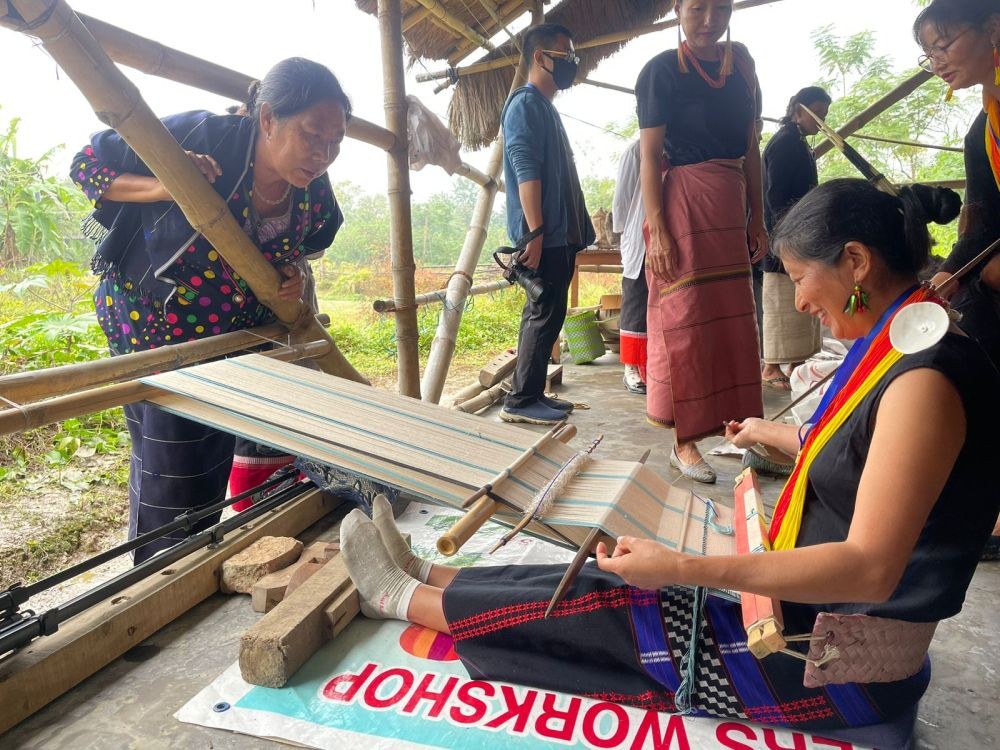A weaver shares a light moment with an attendee as they discuss the loom techniques before the start of a weaving competition held on the second day of the 9th Naga Loin Loom Festival in Diezephe village on December 7. (Morung Photo)

Morung Express News
Diezephe | December 7
"Should the practice of traditional weaving be open to both Naga men and women, or should it remain exclusive to Naga women? Is weavers' remuneration commensurate with the labour involved? What are the ways forward to address the sustenance of the art of weaving in Nagaland?
These were some of the fundamental issues discussed during a 'Weavers Dialogue,' as the second day of the 9th Naga Loin Loom Festival in Diezephe village on December 7 turned its lens on gender norms, fair wages, and sustaining the art of weaving itself.
Women weavers divided into groups tackled the issues and, in doing so, raised some existential questions and challenges revolving around the art of weaving. Chief among those was the intersection of tradition, culture, and modernity and the dilemma it generates.
Men’s role in weaving
On the possibility of men weaving, the 'way forward' was on an expected line, perhaps illustrating the existing societal set-up.
There was a consensus that the profession of traditional weaving best exists as a woman’s domain. The argument was that gender roles have been clearly demarcated as per centuries old custom and tradition, and therefore men-and-weaving was culturally incompatible.
They articulated a common notion that “if men become involved in weaving, they would lag behind others or cannot compete in other masculine-oriented activities.”
However, this does not mean men have no role in this profession. For the promotion of weaving, they should be involved in modernising as well as innovating tools and other weaving techniques and enabling an efficient production process, the group suggested.
The issue of modern technology was also raised by another group dealing with fair weaver’s wage, focusing on the production process and fixing of prices.
Stressing that there is a mismatch between wages and laborious works involved, the group wondered whether the weaving tools can be modernised or mechanised, shortening the production process and thus, making it cost-effective.
Citing the example of 'stinging nettle,' the group highlighted that the step-by-step manual production process is cumbersome and in some cases, take a whole year.
However, when it reaches the market, the prices set for the product is often considered 'high' by consumers, while the producers themselves are not getting their labour’s worth or a classic 'lose-lose' situation for all.
Towards this, there was call for a solution that shortens the production process, making it cost-effective, enabling decent income for weavers and a compatible price for the buyers.
Modernity-tradition dilemma
This, however, presented the dilemma of a trade-off between modernity and tradition. Specifically, if a product can still be considered traditional when modern machines are used in its weaving.
Yes, there will be higher production, and prices would be lower if modern technology or machines are used, but they are for the economy of scale and generating businesses only, opined Vilanuo Angela Yhome, President, Naga Mothers’ Association, the special guest on the second day.
However, we have to ponder what would happen if when traditional products go into machine production are mass-produced by companies, she said, implying that even their intrinsic and associative values would diminish.
We are the owner and we should preserve the same, Yhome added, stressing on the preservation of culture and tradition in its originality.
She further noted that even if techniques are adopted for efficient production, these should be indigenously developed and owned by the community.
We should be consumers as well as preservers of our cultural attires, chipped in Vitono Haralu (Gugu), Social Activist, and Secretary, Exotic Echo Society.
Sustenance
Meanwhile, on measures to sustain the art of weaving, there was consensus among all that it should be promoted at schools as a part of the compulsory curriculum or otherwise, with weaver community as teachers.
Besides, summer camps and workshops, with weavers as trainers, there were also suggestions for annual competitions and events. This was considered as a win-win situation for all stakeholders.
For the 9th edition, Exotic Echo Society joined hands with artisans from different villages and organizations across the State including Choklangan and Pathso Nokeng villages under Noklak district, Leshemi village under Phek district, Peren Touch, Miqlat Ministry, Singrijan Mothers’ Association, Medziphema, Yoruba village under Phek district, Diezephe, and ‘Tukhu Rhi’ under Bade village. The second day also featured workshops on natural dye and coffee."






